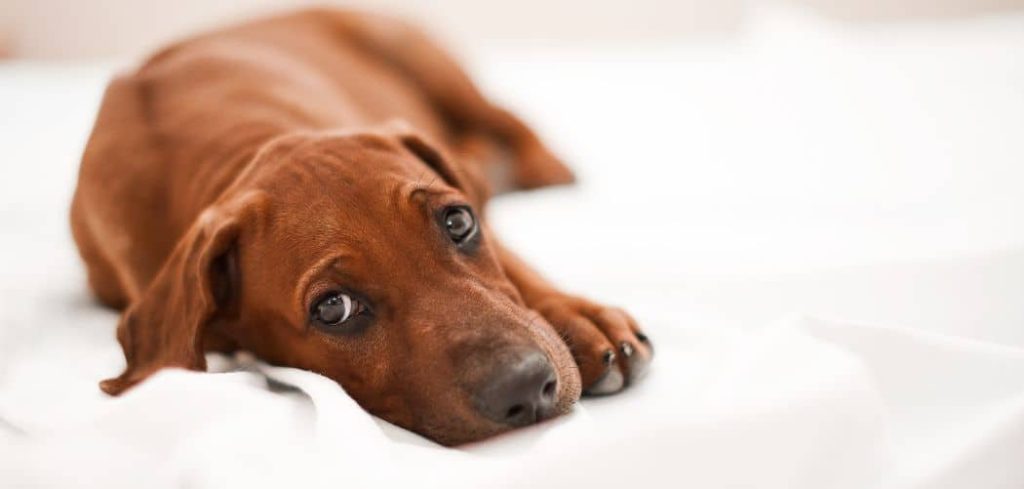It can be alarming for dog owners to notice mucus in their dog’s poop after receiving a vaccine.
While it might seem concerning, there are several possible explanations ranging from mild digestive upset to reactions that may need veterinary attention.
We outline the possible causes of mucus in a dog’s poop after vaccination, what you can do at home, and when to seek veterinary help.
Table of Contents
Mucus in Dog Poop After Vaccine — Why It Happens
Mucus in a dog’s stool after a vaccine often develops from temporary digestive upset, immune system response, or stress related to the vaccination experience. Some dogs may experience mild gastrointestinal irritation following their shots, while others could react to the immune stimulation itself.
Stress from the vet visit, sensitivity to vaccine ingredients, or even coincidental digestive issues can also play a role.
In rare cases, more serious underlying health concerns can become noticeable after a vaccination event.

Mucus in Dog Poop After Vaccine: Common Causes
Mild Digestive Upset
Vaccines stimulate a dog’s immune system, and this process can sometimes cause temporary digestive changes.
A bit of mucus in the stool may be the body’s way of protecting and lubricating the intestines while adjusting to the immune response.
Owners may also notice softer stools, small amounts of diarrhea, or reduced appetite during this time. In most cases, these changes are mild and resolve within a couple of days.
Read more: Mucus in Dog Poop After Deworming (What it means for your dog)
Stress From the Vet Visit
Going to the vet for vaccinations can be stressful for many dogs. Stress affects the gastrointestinal system and may trigger mucus production in the stool.
The stress response can also speed up intestinal transit, making stools looser and coated with mucus.
If the mucus is mild and your dog otherwise seems normal, stress is a likely contributor.
Immune System Response
Vaccines activate the immune system, which can sometimes lead to inflammation in different parts of the body.
For some dogs, this includes the digestive tract. The lining of the intestines may produce extra mucus as part of this reaction.
In these cases, mucus in the stool may occur with other mild side effects such as fatigue, slight fever, or soreness at the injection site.
Sensitivity to Vaccine Ingredients
Some dogs may be sensitive to specific components in vaccines, such as adjuvants or preservatives. This sensitivity can show up as gastrointestinal irritation, which may include mucus in the stool.
Unlike general immune response, ingredient sensitivity may also lead to vomiting, persistent diarrhea, or more pronounced digestive upset.
Coincidental Digestive Issues
Not all cases of mucus in stool after a vaccine are directly related to the shot. Dogs may coincidentally develop digestive upset from dietary indiscretion, food changes, or minor infections at the same time as vaccination.
This overlap can make it difficult to determine whether the mucus is truly vaccine-related or caused by something else entirely.
More Serious Vaccine Reactions
Though rare, some dogs may experience more serious vaccine reactions. In such cases, mucus in the stool may be accompanied by bloody diarrhea, persistent vomiting, lethargy, or signs of an allergic response.
If these occur, veterinary evaluation is needed promptly to rule out more concerning conditions and provide appropriate treatment.
What to Do If Your Dog Has Mucus in Poop After Vaccination
If your dog seems otherwise healthy and only has mild mucus in the stool, supportive care at home may be enough. Make sure your dog has access to fresh water and consider feeding a bland diet, such as boiled chicken and rice, for a couple of days to ease digestion.
Giving your dog plenty of rest and reducing stress can also help the gastrointestinal system settle.
Avoid introducing new foods or treats during this period, as this could worsen the issue.
Probiotics may be beneficial for some dogs in restoring balance to the gut. Always consult your veterinarian before adding supplements, especially after a vaccination.
When to Call or Visit Your Vet
Contact your veterinarian if mucus in your dog’s stool does not improve within 48 hours, or if other symptoms develop alongside it.
Signs that warrant veterinary attention include persistent diarrhea, blood in the stool, vomiting, loss of appetite, or noticeable lethargy.
Seek immediate veterinary care if your dog shows signs of an allergic reaction after vaccination, such as facial swelling, difficulty breathing, or collapse. These reactions are rare but require urgent intervention.
It’s always better to be cautious when it comes to your dog’s health, especially if digestive changes appear suddenly after a vaccine.
Read more: Mucus in Dog Poop After Spay (Why it happens and what to do)
Key Takeaway
Mucus in dog poop after a vaccine is often a mild and temporary side effect, linked to digestive upset, stress, or the immune system’s response. In most cases, it resolves quickly with supportive care at home.
However, persistent symptoms or additional warning signs should not be ignored.
Veterinary guidance ensures your dog receives the care they need, and helps distinguish between harmless side effects and more concerning conditions.
Caring, attentive monitoring will give you peace of mind and help keep your dog healthy after vaccinations.
